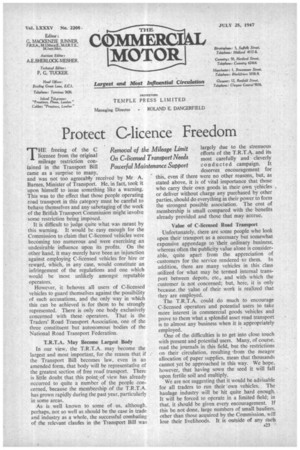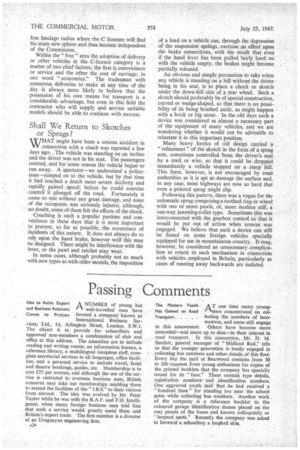Protect C-licence Freedom
Page 25

Page 26

If you've noticed an error in this article please click here to report it so we can fix it.
Tlicensee from the original HE freeing of the C mileage restriction contained in the Transport Bill came as a surprise to many, and was not too agreeably received by Mr. A. Barnes, Minister of Transport. He, in fact, took it upon himself to issue something like a warning. This was to the effect that those people operating road transport in this category must be careful to behave themselves and any sabotaging of the work of the British Transport Commission might involve some restriction being imposed.
It is difficult to judge quite what was meant by this warning. It would be easy enough for the Comrnission to claim that C-licensed vehicles were becoming too numerous and were exercising an undesirable influence upon its profits. On the other hand, it may merely have been an injunction • against employing C-licensed vehicles for hire or • reward, which, in any case, would constitute an infringement of the regulations and one which would be most unlikely amongst reputable operators.
However, it behoves all users of C-licensed vehicles to guard themselves against the possibility of such accusations, and the only way in which this can be achieved is for them to be strongly represented. There is only one body exclusively concerned with these operators. That is the Traders' Road Transport Association, one of the three constituent but autonomous bodies of the National Road Transport Federation.
T.R.T.A. May Become Largest Body In our view, the T.R.T.A. may become the largest and most important, for the reason that if the Transport Bill becomes law, even in •an amended form, that body will be representative of the greatest section of free road transport. There is little doubt that this point ,of view has already occurred to quite a number of the people concerned, because the membership of the T.R.T.A. has grown rapidly during the past year, particularly in some areas.
As is well known to some of us. although, perhaps, not so well as should be the case in trade and industry as a whole, the successful combating of the relevant clauks in the Transport Bill was largely due to the strenuous efforts of the T.R.T.A. and its most carefully and cleverly conducted campaign. It deserves encouragement for this, even if there were no other reasons, but, as stated above, it is of vital importance that those who carry their own goods in their own yehicles or deliver without charge any purchased by other parties, should do everything in their power to form the strongest possible association. The cost of membership is small compared with the benefits already provided and those that may accrue.
Value of C-licensed Road Transport Unfortunately, there are some people who look upon their transport as a necessary but somewhat expensive appendage to 'their ordinary business, whereas often the publicity value alone is considerable, quite apart from the appreciation of customers for the service rendered to them.. In addition, there are many vehicles in this class utilized for what may be termed internal transport between depots, etc., and with which the customer is not concerned; but, here, it is only because. the value of their work is realized that they are employed.
The T.R.T.A. could do much to encourage C-licensed operators and potential users to take more interest in commercial goods vehicles and prove to them what a splendid asset road transport is to almost any business when it is appropriately employed. One of the difficulties is to get into close touch with present and potential users. Many, of course, read the journals in this field, but the restrictions on their circulation, resulting 'from the meagre allocation of paper supplies, mean that thousands cannot yet be approached in this way. We hope, however, that having sown the seed it will fall upon fertile soil and multiply. We are not suggesting that it would be advisable for all traders to run their 'own vehicles. The haulage industry will be hit quite hard enough.. It will be forced to operate in a limited field; in that, it should be given every, encouragement. If this be not done, large numbers of small hauliers. other than those acquired by the Commission, will lose their livelihoods. It is outside of any Mich free haulage radius where the C licensee will find his main new sphere and thus become independent of the Commission. Within the " free " area the adoption of delivery or other vehicles in the C-licence category is a matter of two chief factors; the first is convenience or service and the other the cost of carriage; in one word "economics." The tradesman with numerous deliveries to make at any time of the day is always more likely to believe that the possession of his own means for transport is a considerable advantage, but even in this field the contractor who will supply and service suitable models should be able :to continue with success.
Shall We Return to Skotches or Sprags ? WHAT might have been a serious accident in connection with a coach was reported a few days ago.. The vehicle was standing on an incline and the driver was not in his seat. The passengers entered, and for some reason the vehicle began to run away. A spectator—we understand a policeman—jumped on to the vehicle, but by that time it had reached a inuch more severe declivity and rapidly gained speed; before he could exercise • control it plunged off the road. Fortunately it came to rest without any great damage, and none of the occupants was seriously injured, although, no doubt, some of them felt the effects of the shock. Coaching is such a popular pastime and convenience in these days that it is most important to prevent, so far as possible, the occurrence of incidents of this nature. It does not always do to rely upon the hand brake, however well this may be designed. There might be interference with the lever, or the pawl and ratchet may wear. In some cases, although probably not so much with new types as with older models, the imposition of a load on a vehicle can, through the depression of the suspension springs, exercise an effect upon the brake connections, with the result that even if the hand lever has been pulled fairly hard on with the vehicle empty, the brakes might become partially released. An obvious and simple precaution to take when any vehicle is standing on a hill without the driver being in his seat, is to place a chock or skotch under the down-hill side of a rear wheel. Such a skotch should preferably be of special construction, curved or wedge-shaped, so that there is no possibility of its being brushed aside, as might happen with a brick or big stone. In the old days such a device was considered as almost a necessary part of the equipment of many vehicles, and we are wondering whether it would not be advisable to reinstate it in this important position. Many heavy lorries of old design carried a " refinement ' of the skotch in the form of a sprag arm, sometimes controlled from the driver's seat by a cord or wire, so that it could be dropped immediately a vehicle stopped on a steep hill. This form, however, is not encouraged by road authorities as it is apt to damage the surface and, in any case, most highways are now so hard that even a pointed sprag might slip. Following this pattern, there was a vogue for the automatic sprag comprising a toothed ring or wheel with one or more pawls, oi, more modern still, a one-way jamming-roller type. Sometimes this was interconnected with the gearbox control so that it would be put out of action when reverse was engaged. We believe that such a device can still be found on some foreign vehicles specially equipped for use in mountainous country. It may, however, be considered an unnecessary complication to return to such mechanism in connection with vehicles employed in Britain, particularly as cases of running away backwards are isolated.












































































